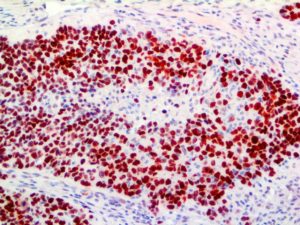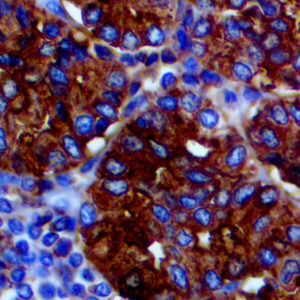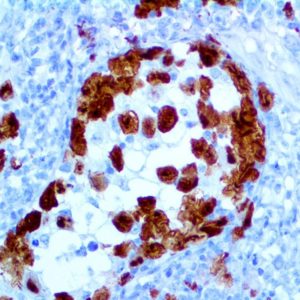
IHC of p53 on an FFPE Breast Carcinoma Tissue
| Intended Use | For In Vitro Diagnostic Use | |||||||||||||||||||||||||||||||||||
| Summary and Explanation | p53 (also known as tumor protein 53 [TP53]) is a transcription factor that regulates the cell cycle and, hence, functions as a tumor suppressor. p53 has been described as ”the guardian of the genome”, referring to its role in conserving stability by preventing genome mutation. p53 has many anti-cancer mechanisms. It can activate DNA repair proteins when DNA has sustained damage; it can also hold the cell cycle at the G1/S regulation point on DNA damage recognition. It can initiate apoptosis, programmed cell death, if DNA damage proves to be irreparable. p53 is central to many of the cell’s anti-cancer mechanisms. It can induce growth arrest, apoptosis and cell senescence. Mutations involving p53 have been found in a wide variety of malignant tumors, including Breast, Ovarian, Bladder, Colon, Lung, and Melanoma. | |||||||||||||||||||||||||||||||||||
| Antibody Type | Mouse Monoclonal | Clone | DO7 | |||||||||||||||||||||||||||||||||
| Isotype | IgG2b/K | Reactivity | Paraffin, Frozen | |||||||||||||||||||||||||||||||||
| Localization | Nuclear | Control | Lung, Breast, Ovarian, Prostate, Colon Carcinoma | |||||||||||||||||||||||||||||||||
| Presentation | p53 clone DO7 is a mouse monoclonal antibody derived from cell culture supernatant that is concentrated, dialyzed, filter sterilized and diluted in buffer pH 7.5, containing BSA and sodium azide as a preservative. | |||||||||||||||||||||||||||||||||||
| Availability |
| |||||||||||||||||||||||||||||||||||
| Note: For concentrated antibodies, please centrifuge prior to use to ensure recovery of all product. | ||||||||||||||||||||||||||||||||||||




